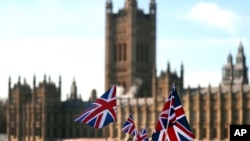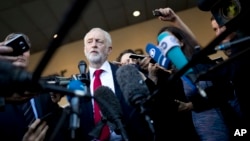They're united in nothing when it comes to political philosophy, but the leaders of Britain's two main political parties share a similar Brexit-related conundrum — namely, how can they corral their fractious lawmakers?
Jeremy Corbyn, leader of Britain's Labor Party, the country's main opposition party, is caught between powerful factions over whether he should back growing calls for a rerun referendum on leaving the European Union. On Tuesday, he edged closer to doing so, but now risks seeing resignations from his front-bench parliamentary team.
Likewise, British Prime Minister Theresa May is also boxed in after her highly contentious Brexit withdrawal agreement was voted down last week in the biggest parliamentary reversal ever handed a prime minister in British history.
A total of 432 lawmakers, including a third of her own ruling Conservative Party, refused to endorse the deal. Her cabinet, split down the middle between rebellious hardline Brexiters and dissident pro-EU ministers, is being buffeted by threats of ministerial resignations and conspiracies.
Wilkins Micawber, the British fictional character conceived by novelist Charles Dickens, would no doubt sympathize with their plight as they try to navigate their way out of a political labyrinth. Both leaders appear to be running down the clock, having adopted the so-called Micawber Principle of hoping "something turns up" to rescue them.
But it isn't clear anything can, and a smashup seems inevitable in what the Economist has dubbed "the mother of all messes." Parliament's rejection of the proposed Brexit deal has thrust the rancorously divided country into a political and constitutional crisis.
May stubbornly plows on with a draft deal she stills appears to believe can be tinkered, if only EU negotiators would play ball. So far, they have refused to do so, as exasperation mounts across Europe with Britain's chaotic state.
On Monday, Corbyn accused May of being trapped in Groundhog Day, as she ruled out a second referendum to break the political deadlock or even delay Britain's scheduled March 29 departure from the European Union. Corbyn was referencing the 1993 film starring Bill Murray, in which a weatherman is fated to live out the same day over and over again.
Customs union with EU
May indicated she would try to secure "concessions" from Brussels to make an amended deal more palatable for critics before bringing it back to the House of Commons for another vote.
As the squabbling continues, traditional procedures and conventions are increasingly being cast aside. Cabinet ministers and lawmakers are in open revolt.
May's proposed deal would see Britain locked in a customs union with the EU for several years while it negotiates a vaguely defined free trade settlement.
In the temporary customs union, Britain would be unable to influence EU laws, regulations and product standards it would have to observe. The transition was reached to avoid customs checks on the border separating Northern Ireland and the Irish Republic, but British lawmakers fear Britain could be trapped indefinitely in the transition.
Threat of resignations
Most lawmakers and commentators say the deal is dead, leaving Britain either having to leave the EU without a deal, which could push the country into recession, or staying in the bloc. The third alternative is developing another last-minute plan. Either of the options could fail to secure a majority in the House of Commons.
Corbyn is backing a parliament vote on holding a rerun referendum to avoid a rebellion from one party faction, but without actually endorsing another plebiscite himself in the hopes he can avoid half his leadership team resigning.
His tactic throughout the uproar over Brexit has been one of calculated equivocation, his critics complain. But it arguably has been dictated by the splits in his own party.
Amber Rudd, May's works and pensions minister, and a possible candidate to replace her, has warned May that up to 40 ministers could quit next week when parliament votes on a motion to prohibit the government from taking the country out of the EU in March without a deal.
How that would work legally is unclear.






